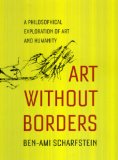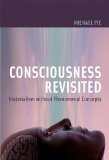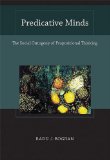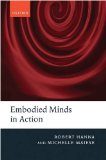February 28, 2009

Found via bookforum, Art Without Borders: A Philosophical Exploration of Art and Humanity by Ben-Ami Scharfstein (University of Chicago Press, 2009) has an excerpt available from the publisher.
Publisher’s synopsis:
People all over the world make art and take pleasure in it, and they have done so for millennia. But acknowledging that art is a universal part of human experience leads us to some big questions: Why does it exist? Why do we enjoy it? And how do the world’s different art traditions relate to art and to each other?
Art Without Borders is an extraordinary exploration of those questions, a profound and personal meditation on the human hunger for art and a dazzling synthesis of the whole range of inquiry into its significance. Esteemed thinker Ben-Ami Scharfstein’s encyclopedic erudition is here brought to bear on the full breadth of the world of art. He draws on neuroscience and psychology to understand the way we both perceive and conceive of art, including its resistance to verbal exposition. Through examples of work by Indian, Chinese, European, African, and Australian artists, Art Without Borders probes the distinction between accepting a tradition and defying it through innovation, which leads to a consideration of the notion of artistic genius. Continuing in this comparative vein, Scharfstein examines the mutual influence of European and non-European artists. Then, through a comprehensive evaluation of the world’s major art cultures, he shows how all of these individual traditions are gradually, but haltingly, conjoining into a single current of universal art. Finally, he concludes by looking at the ways empathy and intuition can allow members of one culture to appreciate the art of another.
Lucid, learned, and incomparably rich in thought and detail, Art Without Borders is a monumental accomplishment, on par with the artistic achievements Scharfstein writes about so lovingly in its pages.
Comments (2)
- culture,philosophy of mind
February 23, 2009

Consciousness Revisited: Materialism without Phenomenal Concepts (Representation and Mind) by Michael Tye (MIT Press, 2009). This book had an expected publication of March 31 but is already available. Previews are available at Amazon and Google Books.
(link for UK)
Product Description
We are material beings in a material world, but we are also beings who have experiences and feelings. How can these subjective states be just a matter of matter? To defend materialism, philosophical materialists have formulated what is sometimes called “the phenomenal-concept strategy,” which holds that we possess a range of special concepts for classifying the subjective aspects of our experiences. In Consciousness Revisited, the philosopher Michael Tye, until now a proponent of the the phenomenal-concept strategy, argues that the strategy is mistaken.
A rejection of phenomenal concepts leaves the materialist with the task of finding some other strategy for defending materialism. Tye points to four major puzzles of consciousness that arise: How is it possible for Mary, in the famous thought experiment, to make a discovery when she leaves her black-and-white room? In what does the explanatory gap consist and how can it be bridged? How can the hard problem of consciousness be solved? How are zombies possible? Tye presents solutions to these puzzles—solutions that relieve the pressure on the materialist created by the failure of the phenomenal-concept strategy. In doing so, he discusses and makes new proposals on a wide range of issues, including the nature of perceptual content, the conditions necessary for consciousness of a given object, the proper understanding of change blindness, the nature of phenomenal character and our awareness of it, whether we have privileged access to our own experiences, and, if we do, in what such access consists.
Torin Alter discusses Chapter 3 at Brain Pains.
Michael Tye’s home page, with links to online papers.
Comments (0)
- consciousness,new books
February 22, 2009

Passage by Connie Willis (Bantam, 2001, 2002) is a “neurofictional” account of scientific research on near-death experiences. Willis is usually classified as a science fiction writer, but here that would be in the sense of “fiction about science.” The premise is that a researcher has found a psychoactive drug that simulates the near-death experience. He enlists psychologist Joanna Lander to interview research subjects but she soon volunteers to take the drug herself and this intensifies her quest to discover the meaning of the experience.
The back of the book has a rather odd blurb from Newsday that calls Willis “a true heir to John Donne, Kurt Godel and Preston Sturges….” so try to imagine that combination in a novel! I found the story compelling and consumed the whole 780 pages over about three days.
Comments (0)
- cognitive science,consciousness,fiction
February 20, 2009

Predicative Minds: The Social Ontogeny of Propositional Thinking (Bradford Books) by Radu Bogdan (MIT Press, 2009)
Product Description
The predicative mind singles out and represents an item in order to attribute to it a property, a relation, an action, an evaluation; it thinks, and says, of a house that it is big, of a car that it is to the left of the house, of a cat that it is about to jump, of a hypothesis that it is plausible. The capacity to predicate appears to be neither innate nor learned, yet it is universal among humans. Puzzling in evolutionary, developmental, and philosophical terms, the mental competence for predication still awaits a coherent and plausible explanation. In this exploration of the predicative roots of human thinking, Radu Bogdan takes up the challenge.
Bogdan argues that predication is not only an outcome of development but also a by-product of uniquely human features of development, many of them social in nature and unrelated to representation, cognition, and thinking. Humans develop predicative minds for disparate reasons, which bear initially on physiological coregulation, affective and manipulative communication, and the socially shared acquisition of words. Once developed, the competence for predication in turn redesigns human thinking and communication. Predication is at the heart of conscious, deliberate, explicit, and language-based human thinking, and it is the fuel of higher mental activities. Understanding the uniqueness and representational power of the human mind, Bogdan contends, requires an explanation of why and how predication came to be.
Comments (0)
- cognitive science,new books,philosophy of mind
February 18, 2009

Embodied Minds in Action by Robert Hanna and Michelle Maiese (Oxford University Press, 2009) – Amazon promises “in stock on Feb. 22” and they have a sample available online.
Product Description
In Embodied Minds in Action, Robert Hanna and Michelle Maiese work out a unified treatment of three fundamental philosophical problems: the mind-body problem, the problem of mental causation, and the problem of action. This unified treatment rests on two basic claims. The first is that conscious, intentional minds like ours are essentially embodied. This entails that our minds are necessarily spread throughout our living, organismic bodies and belong to their complete neurobiological constitution. So minds like ours are necessarily alive. The second claim is that essentially embodied minds are self-organizing thermodynamic systems. This entails that our mental lives consist in the possibility and actuality of moving our own living organismic bodies through space and time, by means of our conscious desires. The upshot is that we are essentially minded animals who help to create the natural world through our own agency. This doctrine–the Essential Embodiment Theory–is a truly radical idea which subverts the traditionally opposed and seemingly exhaustive categories of Dualism and Materialism, and offers a new paradigm for contemporary mainstream research in the philosophy of mind and cognitive neuroscience.
Comments (0)
- consciousness,new books,philosophy of mind







